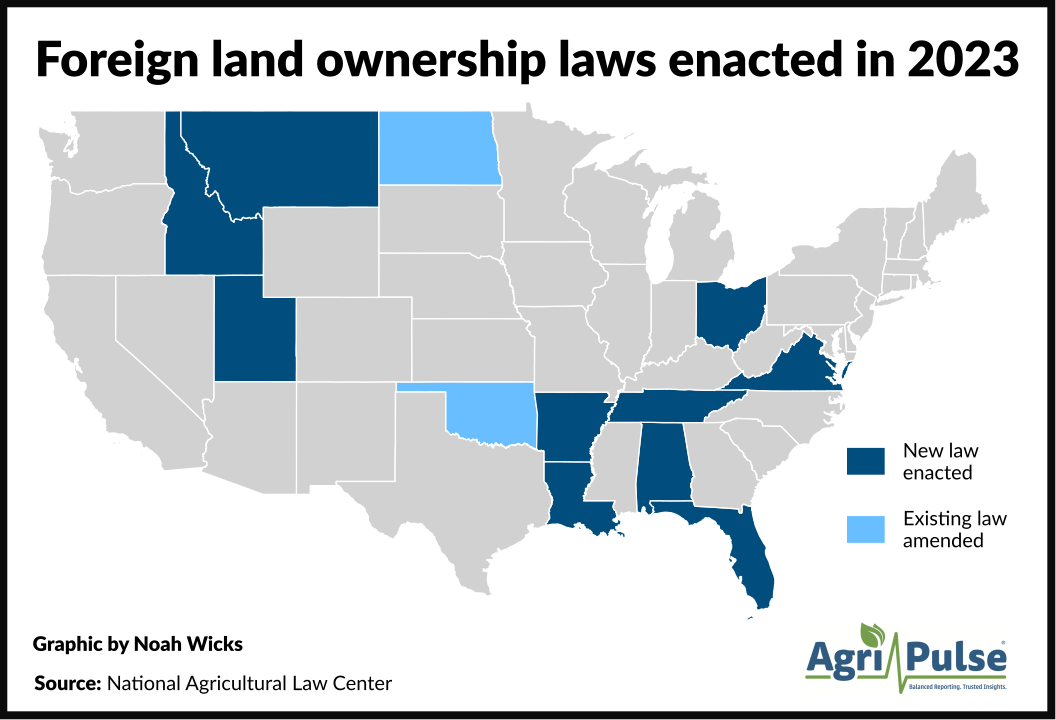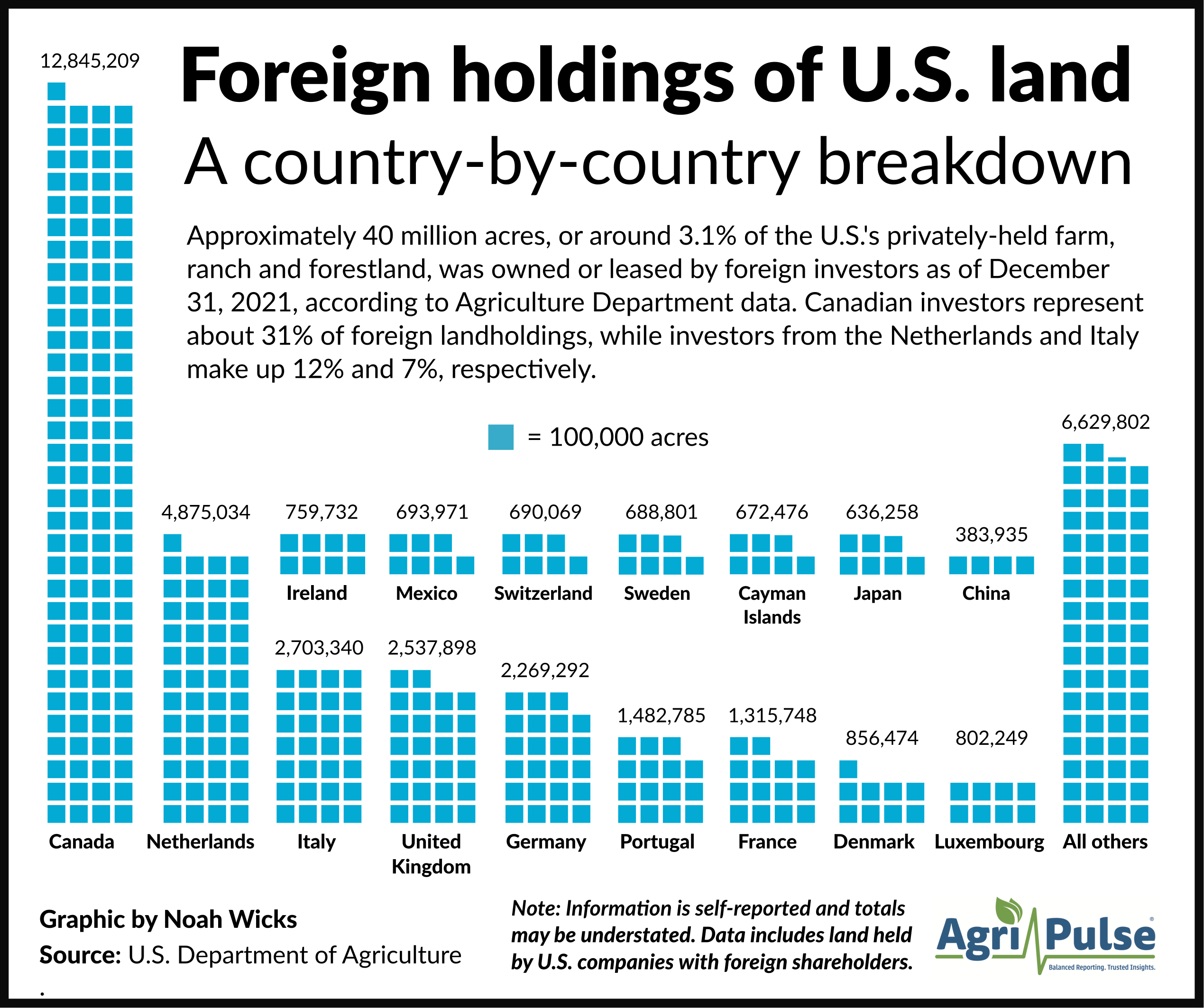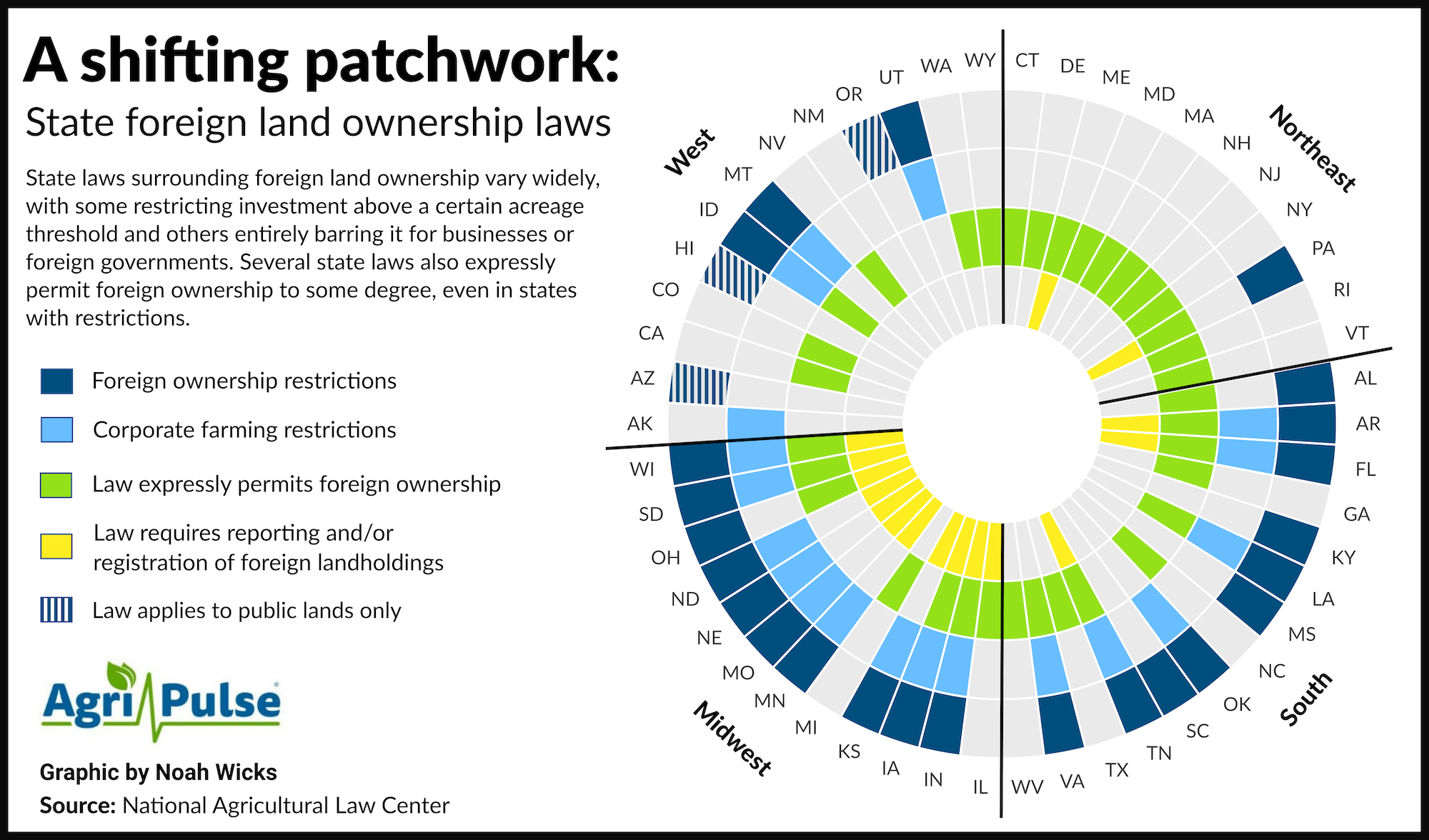An ultimatum to seed and agrochemical giant Syngenta to divest itself of an Arkansas research farm is the first action taken to enforce one of 10 new state foreign land ownership laws that were approved this year.
Officials with Syngenta, which is owned by the China National Chemical Corp., say selling the 160 acres will make it harder for the company to comply with federal product safety and efficacy regulations, which require the company to test products across multiple regions of the U.S.
The divestment order by Arkansas Attorney General Tim Griffin was accompanied by a $280,000 penalty for filing an ownership report late.
The action comes as Congress also is considering similar bans on ownership of farmland by companies in China and other target countries.
Montana, Idaho, Utah, Arkansas, Louisiana, Tennessee, Ohio, Virginia, Alabama and Florida all enacted new foreign ownership laws in the 2023 legislative session. Micah Brown, a staff attorney at the National Agricultural Law Center, said most of the new laws ban land ownership by investors from certain countries, including China, Iran, North Korea and Russia.
Syngenta's possession of 160 acres in Craighead County violates Arkansas’ newly-enacted law prohibiting an “agent, trustee or other fiduciary for a prohibited foreign-party controlled business” from owning land in the state, Paxton told the company in a letter.
The 160-acre site, owned by Syngenta subsidiary Northrup King Seed Co., is used to test and generate data on products meant for farmers in the South, according to Vern Hawkins, the regional director of Syngenta North America Crop Protection.
“If you want to tell a farmer that your product will wo rk in their growing conditions, you have to have data that you can correlate to their situations,” Hawkins told Agri-Pulse in an interview. “So we’ll do studies in regions with those different climates, which are part of the development protocol. In many cases, there are regulatory requirements as well.”
rk in their growing conditions, you have to have data that you can correlate to their situations,” Hawkins told Agri-Pulse in an interview. “So we’ll do studies in regions with those different climates, which are part of the development protocol. In many cases, there are regulatory requirements as well.”
While field trials don’t necessarily need to be specific to the state of Arkansas under Environmental Protection Agency or USDA regulations, the company is required to substantiate claims that they have on a registered label, Hawkins said. Without the field site, the company would still need to find a way to do work that is “representative of that southern geography.”
“We’ll have to look for other solutions to develop these seed products going forward when we’re not able to use the Arkansas site,” Hawkins said.
Syngenta, which was based in Switzerland before being purchased by the China National Chemical Corp. in 2017, owns about 1,500 acres of agricultural land in the U.S. for research, development, regulatory trials and production, according to a statement from the company.
According to an Agri-Pulse analysis of USDA data, Syngenta’s crop protection arm owns 200 acres in Illinois and 77 acres in California, while its seeds division owns 220 acres in Illinois, 195 acres in Missouri, 80 acres in Washington and 19 acres in Nebraska. The company's flowers division owns 3.8 acres in California.
Syngenta has owned the Arkansas land since 1988, Hawkins said.
Arkansas Gov. Sarah Huckabee Sanders, during a press conference last week, pointed to the Defense Department’s classification of the China National Chemical Corp. as a “Chinese military company” operating in the United States and said its control over Syngenta and the 160-acre plot of land represents a “clear threat” to the state of Arkansas.
“Seeds are technology,” Huckabee Sanders said. “Chinese state-owned corporations filter that technology back to their homeland, stealing American research and telling our enemies how to target American farms. That is a clear threat to our national security and to our great farmers.”
Hawkins said the company is currently assessing its options concerning the Arkansas land and said that the company would have to be “mindful and careful” as it looks at transitioning the work it conducted at the site to a new location. He said no one from the Chinese government “has input” on Syngenta North America’s “day-to-day operations or activities.”
“I’ve been in this position since 2010 and I can assure you that I’ve had nobody from China come over to work in the business or to have any influence on anything we’ve done with land or business practices,” Hawkins said.
It’s easy to be “in the know” about what’s happening in Washington, D.C. Sign up for a FREE month of Agri-Pulse news! Simply click here.
Chinese investment in U.S. agricultural land has become a prominent concern among lawmakers at both the federal and state levels in recent years. Chinese investors held 383,935 acres of U.S. land in 2021, less than 1% of all foreign-held land and 0.03% of all privately held U.S. land, according to the USDA.
 The 10 new state land ownership laws largely differ in approach from what NALC's Brown calls “traditional” foreign land laws, which are found in several Midwestern and Eastern states and tend to apply to “individual aliens” or “foreign business entities” from any foreign country.
The 10 new state land ownership laws largely differ in approach from what NALC's Brown calls “traditional” foreign land laws, which are found in several Midwestern and Eastern states and tend to apply to “individual aliens” or “foreign business entities” from any foreign country.
“These newer laws are more focused and geared towards specific countries,” he said.
Some 24 states specifically limit or restrict foreign ownership to some degree, though these laws vary significantly from state to state.
Some focus specifically on foreign business entities or governments, while others apply to individuals. A few, like South Dakota and Pennsylvania, set an acreage limit for foreign landholdings.
The restrictions sometimes overlap with corporate farming or foreign land reporting laws. Arkansas, for instance, not only bars investors “controlled” by the governments of certain countries from owning land, but also requires entities to report their landholdings.
Some states, including several with foreign ownership restrictions, also have statutory language expressly permitting foreign ownership to some degree. These laws contain exemptions or exceptions allowing foreign investment in certain situations, like when a foreign person inherits land through a will, converts agricultural land for non-farming uses or invests in land as part of a real estate investment trust, or REIT.
Several of the states with long-standing foreign land laws, such as Iowa, also have exceptions allowing foreign crop protection companies like Syngenta to own land for research, development and experimentation purposes, Brown said.
 While the Arkansas attorney general’s decision is the first example of enforcement of a state foreign land law enacted during the 2023 session, this is not the first time a foreign land law has been enforced. States like Iowa and Minnesota have been enforcing foreign land laws for decades.
While the Arkansas attorney general’s decision is the first example of enforcement of a state foreign land law enacted during the 2023 session, this is not the first time a foreign land law has been enforced. States like Iowa and Minnesota have been enforcing foreign land laws for decades.
Smithfield Foods, for instance, turned over 40% of the approximately 50 barns it had leased from Iowa producers to the U.S.-based Christensen Farms to comply with the state's foreign land law in 2015, according to a letter the company sent to the Iowa Attorney General. The remaining barns would be converted into traditional contract finishing and custom feeding arrangements, the company said.
Smithfield is owned by the WH Group, a publicly traded company based in Hong Kong. The company owns around 146,000 acres of land in the U.S., according to USDA data. This represents approximately one-third of the 383,935 acres of land owned by Chinese investors or U.S. companies with Chinese shareholders.
The company is also headquartered in Virginia, which signed a new bill addressing foreign farmland ownership into law in April. But in an email, Smithfield spokesman Jim Monroe told Agri-Pulse the new statute, which bars China and other “foreign adversaries” from purchasing land in the state, does not apply to the company since it is “not owned or controlled by a foreign government.”
For more news, go to Agri-Pulse.com.


